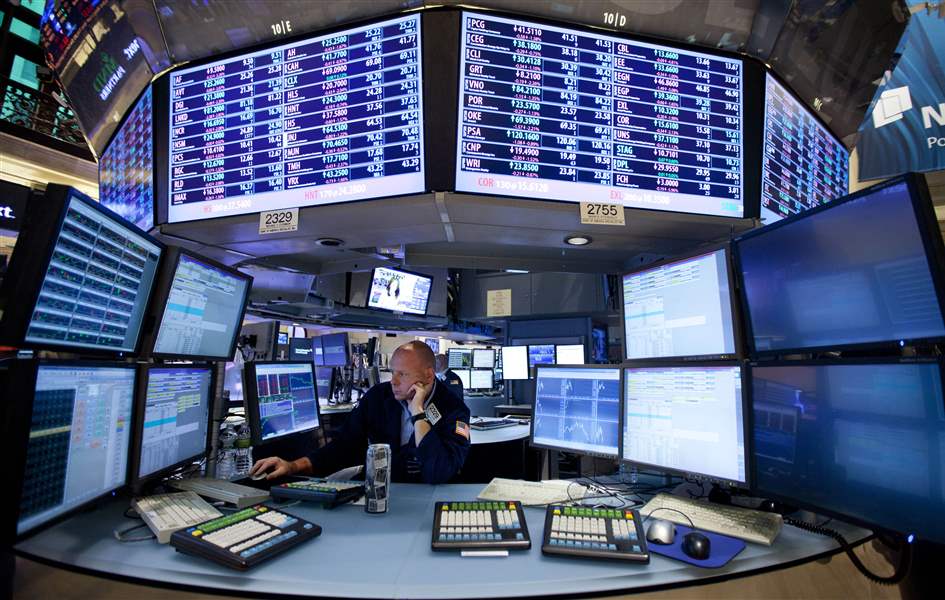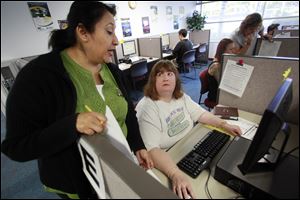
U.S. firms add no jobs for 1st time since 1945
Unemployment still 9.1%; recession fears mount
9/3/2011
A trader at the New York Stock Exchange stares at his screen as the jobs report for August was the worst since September, 2010. The Dow Jones industrial average Friday fell 253 points, or more than 2 percent.
ASSOCIATED PRESS

A trader at the New York Stock Exchange stares at his screen as the jobs report for August was the worst since September, 2010. The Dow Jones industrial average Friday fell 253 points, or more than 2 percent.
WASHINGTON — Employers added no jobs in August — an alarming setback for the economy that renewed fears of another recession and raised pressure on Washington to end the hiring standstill.
Worries flared Friday after the release of the worst jobs report since September, 2010.
Payrolls went unchanged, the first time since 1945 that the government reported a net job change of zero.
The unemployment rate stayed at 9.1 percent.
The dismal news sent stocks plunging. The Dow Jones industrial average fell 253 points, or more than 2 percent.
Some economists said the possibility of a double-dip recession was increasing.
“As long as payrolls are weak, you will continue to hear cries of not just recession risk, but cries that the United States is in a recession and we just don’t know it,” Ellen Zentner, the senior U.S. economist for Nomura Securities, said.
Analysts say the economy cannot expand unless hiring picks up.
In the first six months of 2011, growth was measured at an annual rate of 0.7 percent.
Firms are mostly keeping their payrolls intact. They’re not laying off many workers. But they’re not hiring, either.
Without more jobs to fuel consumer spending, economists say another recession would be inevitable.
Consumer spending accounts for about 70 percent of economic growth.
Like a wobbling bicycle, “you either reaccelerate or you fall over,” James O’Sullivan, chief economist at MF Global, said. “Something has to give.”
When growth is slow and joblessness high, companies feel little pressure to raise pay and benefits. In August, for instance, hourly wages fell.
And when unemployment is chronically high, even many people who have jobs worry about losing them. So they’re less likely to spend.
Eventually, as consumers cut back, corporate sales decline. Companies scale back hiring even more. Weak spending and hiring can feed on each other and edge the economy closer to recession.
When the economy is barely growing, it’s vulnerable to shocks such as natural disasters and political upheavals. An economy growing 5 percent a year can absorb more punishment than one growing at 1 percent before it would slip into recession.
Consumer and business confidence was shaken this summer by the political standoff over the federal debt limit, a downgrade of long-term U.S. debt, and Europe’s fiscal crisis. Tumbling stock prices escalated the worries.
Even before it stalled last month, job growth had been sputtering. The economy added 166,000 jobs a month in the January-March quarter, 97,000 a month in the April-June quarter, and just 43,000 a month so far in the July-September period.
“Underlying job growth needs to improve immediately in order to avoid a recession,” HSBC economist Ryan Wang said.

Sofia Serenity Mackinnon, left, helps Trudi Edmeades of Lake Oswego, Ore., search for work. Last month, employers felt little pressure to raise pay and benefits.
“The importance of job growth cannot be overstated,” Joshua Shapiro, chief U.S. economist at MFR Inc., said.
The economy needs to add at least 250,000 jobs a month to bring down the jobless rate rapidly. The rate has been above 9 percent in all but two months since May, 2009.
Roughly 14 million Americans are unemployed.
And 11.4 million more are either working part time but want full-time jobs or have given up looking for work and aren’t counted as unemployed.
The weakness was emphasized by revisions to the jobs data for June and July. Collectively, those figures were lowered to show 58,000 fewer jobs added than thought.
The downward revisions were all in government jobs.
The average workweek declined in August. Cutbacks by federal, state, and local governments have erased 290,000 government jobs this year, including 17,000 in August.
This is not the first time that job growth, the most important measure of the economy for many Americans, has ground to a halt since the recovery. It dropped into negative territory in the middle of last year after three months of strong showings.
Even if the economy does not contract, the projected growth rate is so slow it will not be enough to absorb people entering the labor market, much less the unemployed.
“We have virtually the same number of jobs as we did in January, 2000,” said Patrick J. O’Keefe, the director of economic research at J.H. Cohn, an accounting firm. “Were jobs to continue to grow at the 2011 monthly average, it would take more than four years to return to the prerecession employment level.”
“There is no silver lining in this one,” Steve Blitz, senior economist at ITG Investment Research, said. “It is difficult to walk away from these numbers without the conclusion that the economy is simply grinding to a halt.”
In Ohio, U.S. House Speaker John Boehner said the jobs report shows the nation’s economy is “stagnant” and he hopes the President and other Democrats will listen to Republican ideas to address the problem.
“... The American people are still rightfully asking the question: ‘Where are the jobs?’” he said as he spoke at a ribbon cutting in his home town of West Chester, a Cincinnati suburb. “Republicans are continuing to listen to the American people and are focusing our efforts on removing barriers to job growth.”
On Thursday, Mr. Obama will give a televised speech to a joint session of Congress to introduce a plan for creating jobs and spurring economic growth.
Mr. Boehner said he looks forward to hearing the President’s plan for job creation.
“But I’m hopeful the White House and Senate Democrats will work with us on our ideas that will help end economic uncertainty,” he said.
Mr. Boehner supports a House Republican approach focused on reducing government spending and regulations and lowering tax rates.
The Obama Administration has estimated that unemployment will average about 9 percent next year, when Mr. Obama will seek re-election.
The rate was 7.8 percent when he took office.
The White House Office of Management and Budget projects overall growth of just 1.7 percent this year.